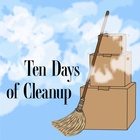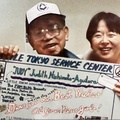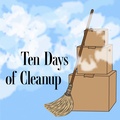I stood in front of the open storage unit, my hands on my hips. I felt like I was an Olympic athlete who had accomplished a marathon or swim relay race. All I had done was clear out a full container at EZ Storage. Well, almost cleared it out. There was still one bag in the corner. Sycamore, my daughter, was at my side, as she had been through this whole project. Today was Saturday, one day before the last day of May 2020, our deadline. Would we complete our project a day before our established deadline? I had already gotten paid for the entire job, so this wasn’t a matter of money, but a matter of pride.
I quickly jotted down what we had uncovered and handled these past nine days:
- World War II camp photograph albums and wood name plate
- Vintage car grille
- Perfume bottles
- Mikasa dinnerware set
- Softball equipment, including full catcher’s outfit
- Suzee Ikeda Motown 45s
- Rice cracker factory molds
- Old camellia seeds
Each of these items was identified; their backgrounds documented. Most of them ended up in their rightful place. Sycamore and I were regularly using our Mikasa plates. Using historic china made me happy, even if we were eating microwaved frozen burritos or veggie burgers. The everyday became special, something to celebrate.
Together we pulled out the white garbage bags from the corner and pulled open the red plastic drawstrings in the middle of the open concrete floor. Inside were brown grocery store bags and inside them were stacks of old books and newspaper clippings, all in Japanese.
“What do they say, Mom?” My ex-partner, Stewart, and I had sent Sycamore to our local Japanese Saturday school, but she never got beyond katakana before she quit to sleep in weekend mornings.
“Let’s see. It all seems to be poems. Written by someone named Hayashida Morio.”
Before I could say more, Sycamore had taken out her iPad, her fingers flying on the keyboard on the screen. I was still in awe of her ability to quickly negotiate a keyboard at the young age of ten.
“It says here that he was one of the founders of the Japanese Credit Union. Isn’t that where you went to borrow money for your truck?”
Yes, I had driven Sycamore in a car I borrowed from Stewart to Los Angeles’ Crenshaw District. They offered me the best interest rates.
“I think someone from a place called Jack is translating his poetry.”
I pulled the iPad toward me. “That’s not Jack; it’s the J-A-C-C-C,” I said. It was the cultural center in Little Tokyo. “Remember the place with the giant rocks in the red plaza.”
“Oh, yeah. I think that we went over there for Nisei Week.”
The translator’s name was Kenji C. Liu. Interesting, I thought. Kenji was definitely a Japanese name, but Liu was Chinese. I knew, however, that I couldn’t make any assumptions by just the name. Stewart had a musician friend whose name was Kenji, but he was a Black man from Louisiana and wasn’t of Japanese heritage, at least that he was aware of.
I went to his website, www.kenjiliu.com, and clicked on the page to contact him. I typed in my name and e-mail address and explained briefly in the message window that I wanted to know if Morio Hayashida’s poetry was valued in the Little Tokyo community.
We pushed the bag of poetry onto the bed of the truck. I had brought a push broom and dustpan and began to sweep the floor of the container. Even though my client was a complete mystery and that I was not owed any more money, I felt a responsibility to properly complete the job. Sycamore held the dustpan as I collected the bits of popcorn styrofoam and dirt with my broom.
Sycamore was dumping the trash into a plastic bag when my phone dinged. Kenji replied to my e-mail. Like all the other individuals I had encountered over the nine days, he seemed enthused by my interest in his subject matter. He wrote:
I was just translating one of Hayashida’s poems when I received your e-mail. It’s called, “Sparkling Sea.”
Sycamore read the e-mail reply over my shoulder. “He must be really obsessed with this guy.”
I scrolled through the long message. “He included one of the poems in both Japanese and English.”
The poem started in katakana:
ドドドドドウ
ドドドドドウ
“I know how to read that,” Sycamore said. “Dou dou dou dou douu. Dou dou dou dou douu. What kind of poem is this?” She pursed her lips above the mask that was pulled down below her chin. “I don’t know how good of a poet this guy is.” Sycamore was skeptical and to be honest, so was I.
The next stanza began in hiragana:
ほつほつほつほつほう
はつはつはつはつはあ
I looked at the way Kenji had translated both stanzas in Japanese:
Boom boom boom boom booom
Boom boom boom boom booom
And then:
Hóhóhóhóhō
Háháháháhā
“That second part sounds like someone laughing,” Sycamore commented. I was amazed at her observation.
I then replied to Kenji, asking if he would be interested in receiving the poems. He asked if I could take photos of what I had and that he would get back to me once he returned home from his father’s house. After I did what he asked, Sycamore wondered out loud, “What should we do until he calls?”
Reading Hayashida’s poem about the sparkling sea planted an idea in my head. The beaches in Los Angeles County had just opened up. Sycamore and I couldn’t spread out towels and sunbathe. But we could walk. Right now a hike around the seashore sounded completely liberating.
I drove us to a less popular beach, at least one that the out-of-towners didn’t often frequent. Rat Beach. It didn’t mean that the beach was full of rats, but that it was located “Right After Torrance” or “Redondo and Torrance” beach. We moved the bag of poetry from the bed of the truck into the cab, which I could lock. Even though the old books and newspaper clippings would not be of value to most people, I felt like I had a responsibility as a caretaker of the past.
We pulled off our sandals and held onto the straps as we plowed through the sand. The beach was actually crowded with a few people breaking the rules and setting up umbrellas and towels on the beach. People seemed to always be breaking the rules during the pandemic.
Our toes touched the brownish water as we walked south towards Palos Verdes Peninsula. I had been in Ireland once with Stewart but never made it over to France. I had seen photos of the French Riviera and the view from Rat Beach made me feel that this was Southern California’s mini-Riviera. As I was contemplating such things, I barely noticed that Sycamore had been intently focused on the waves crashing onto the shore.
“I heard it, Mom, I heard it.”
“What?”
“Dou dou dou dou douu. Dou dou dou dou douu. The ocean was booming. I think that maybe that Hayashida man was right.”
* * * * *
We were barely back in the truck when Kenji called my cell phone. “Where did you get the copy of the Torch?”
“You know it?”
“It’s a rare publication that was released in conjunction with the 1932 Olympics in L.A. We have it at the JACCC library. Hayashida’s grandson, Hirokazu Kosaka, works at the JACCC. I’ve been working on this translation project with him.”
“Oh, you probably don’t need another one.”
“No, we’d love to have it.” Because of COVID, Kenji was working at home, but was open to a drop-off of the materials.
Luckily his house was on our way back home from the beach.
Sycamore and I, fully masked, carried the bag to his doorstep, rang the doorbell and then made our way back to the truck. When I heard the door open, I turned to see a masked Asian man with close-cropped hair. He had kind eyes.
Kenji acknowledged us with a wave of his right hand. “Thank you,” he called out.
“No, thank you.” This was the end of our journey. Ten days of cleanup of a very mysterious storage unit. I had no idea how all those items got there in the first place. They seemed like trash, but someone out in the world saw their worth.
“Wait!” Kenji called out. “I’m supposed to forward you something.” He bent over his phone, pressing down on some keys.
My phone dinged with his forwarded text:
Congratulations on completing your cleanup. On Memorial Day, please come to the Pacific Asia Museum in Pasadena at 6 PM.
Reference:
- JACCC’s Issei Poetry Project
- Six poems written by Morio Hayashida translated by Kenji C. Liu
- “Street of Lights” [VIDEO]
- “Forgetting Summer” [VIDEO]
- “Conversation of Tomorrow” [VIDEO]
- Poem by Kenji C. Liu: “Still pushing through us”
- Kenji C. Liu’s website
© 2021 Naomi Hirahara





